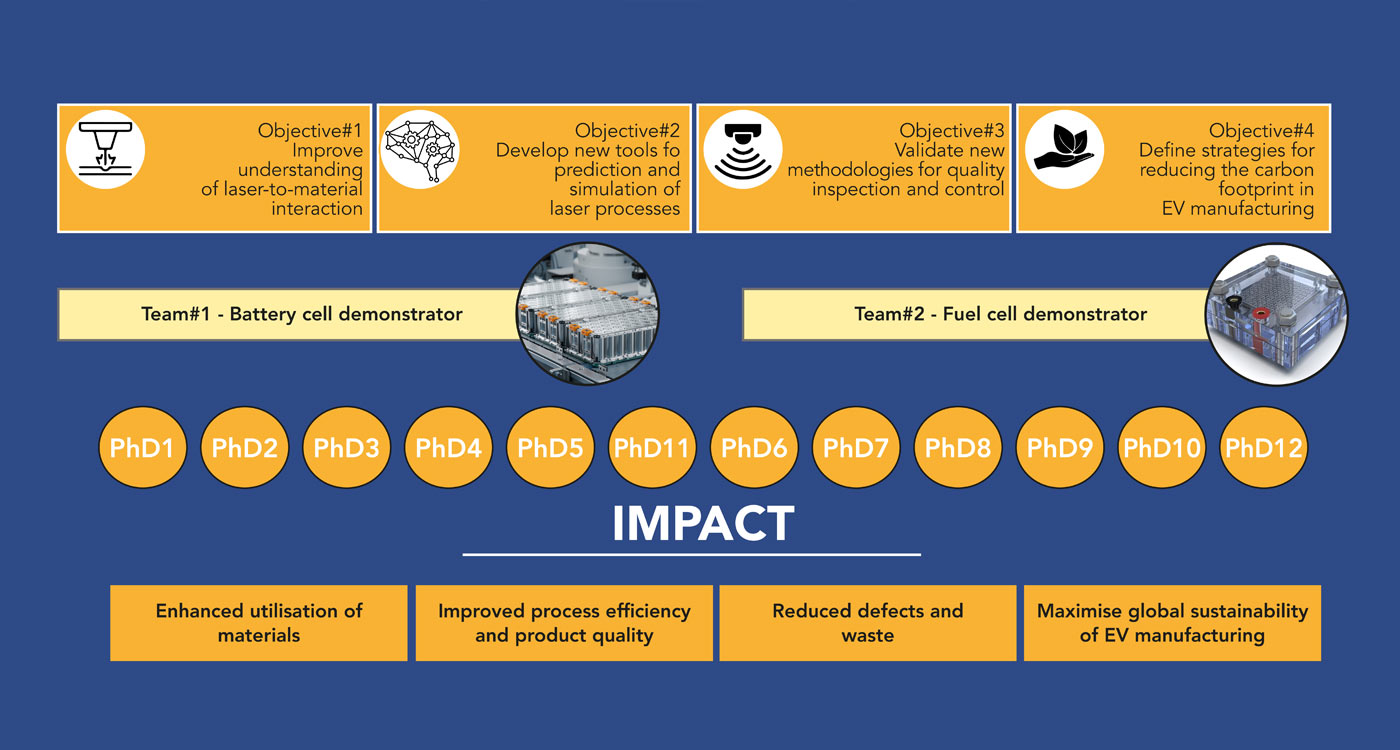



Topic: Laser-based manufacturing of battery cell production – focus on beam shaping
Host: UNIBO
Secondment: WARWICK
Internship: FERRARI
Secondment II: UNIBO
Topic: Laser-based manufacturing of battery cell production – focus on ultra-fast processing
Host: UNIBO
Secondment: WARWICK
Internship: IPG
Secondment II: UNIBO
Topic: Advanced process modelling for battery cell production
Host: ILMENAU
Secondment: UNIBO
Internship: CELLIMPACT
Secondment II: UNIBO
Topic: In-process monitoring and control for battery cell production
Host: WARWICK
Secondment: UNIBO
Internship: PRECITEC
Secondment II: UNIBO
Topic: LCA and sustainability assessment for battery cell production
Host: BIUST
Secondment: UNIBO
Internship: FERRARI
Secondment II: UNIBO
Topic: Laser-based manufacturing of fuel cell production – focus on beam shaping
Host: LULEA
Secondment: ILMENAU
Internship: JENOPTIK
Secondment II: LULEA
Topic: Laser-based manufacturing of fuel cell production – focus on ultra-fast processing
Host: LULEA
Secondment: ILMENAU
Internship: POWERPHOTONIC
Secondment II: LULEA
Topic: Advanced process modelling for fuel cell production
Host: ILMENAU
Secondment: LULEA
Internship: PPOT
Secondment II: LULEA
Topic: In-process monitoring and control for fuel cell production
Host: WARWICK
Secondment: LULEA
Internship: LMI
Secondment II: LULEA
Topic: LCA and sustainability assessment for fuel cell production
Host: PENTVARS
Secondment: WARWICK
Internship: LMI
Secondment II: LULEA
Topic: Laser-based manufacturing of battery cell– focus on drying of anode slurry
Host: UNIBO
Secondment: WARWICK
Internship: LMI
Secondment II: Lulea
Topic: Modelling validation by means of high-speed imaging with synchrotron radiation
Host: ILMENAU
Secondment: UNIBO
Internship: RAYLASE
Secondment II: LULEA

Approximate 30% of the emissions of e-vehicles comes from the manufacturing processes, due to un-optimised material utilisation, low process efficiency, product defects and waste.
Current state-of-the-art identifies laser material processing technologies the heart of e-vehicles manufacturing. Advances in laser technologies and new generation scanning optics in fuel cell and battery manufacturing have the potential to offer enhanced utilisation of materials, improved process efficiency and product quality, allowing significant reduction in CO2 equivalent. Lasers4NetZero will establish an innovative training programme that aims at coaching a new generation of creative, entrepreneurial and innovative doctoral candidates (PhDs) focused on laser material processing, artificial intelligence for quality control, advanced process simulation and predictive lifecycle and sustainability analysis for e-vehicles manufacturing. This novel programme will contain both scientific and transferable training activities and will benefit from training across the network (e.g. secondments). In total, 12 PhDs will be enrolled, developing individual research projects within the project. Individual PhD projects will integrate novel methods and approaches for laser material processing (cutting and welding) aided by laser beam shaping and ultra-fast scanning technologies with the ultimate goal to enhance utilisation of materials, improve process efficiency and product quality and reduce defects and waste. The consortium involves 6 Academic partners and 10 Industrial partners guaranteeing that final solutions will be close to the market. The close cooperation among multidisciplinary partners will ensure knowledge transfer to cross the valley-of-death between research and implementation. To maximise impact, two demonstrators (fuel cells and battery systems) will be developed in conjunction with the Industrial partners.
